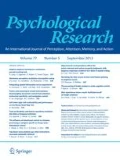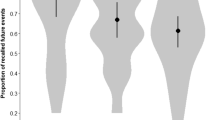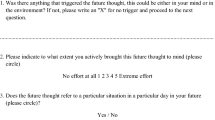Abstract
Numerous studies on episodic future thinking have demonstrated that individuals perceive their future as more positive and idyllic than their past. It has been suggested that this positivity bias might serve a self-enhancement function. Yet, conflicting findings and lack of systematic studies on the generalizability of the phenomenon leave this interpretation uncertain. We provide the first systematic examination of the positivity bias across different domains and tasks of future thinking. First, we use the same tasks in two different domains of future thinking, representing an episodic (events) and a semantic dimension (self-images), respectively. Second, we use two different measures of positivity bias (i.e., frequency of positive versus negative instances and their distance from present). Third, we contrast each measure in each domain for events/self-images related to self versus an acquaintance. Experiments 1 and 2 showed a strong, general tendency for the generation of positive future events/self-images, but most pronounced for self, relative to an acquaintance. Experiments 3 and 4 demonstrated that positive future events/self-images were dated closer to present, whereas negative ones were pushed further into the future, but only for self and not for an acquaintance. Our results support the idea that the positivity bias in future thinking serves a self-enhancement function and that this bias likely represents a similar underlying motivational mechanism across different domains of future thinking, whether episodic or semantic. The findings add to our understanding of the motivational functions served by different forms of future thoughts in relation to the self.

Similar content being viewed by others
Notes
Given that the number of generated events varied across participants, we ran the analysis once more using the proportion of the events in each valence category rather than the raw frequency. The patterns and results did not change.
As in Experiment 1, as the number of generated future self-images varied across participants, we ran the analysis once more using the proportion of the events in each valence category rather than the raw frequency. The patterns and results did not change.
References
Addis, D. R., Wong, A. T., & Schacter, D. L. (2007). Remembering the past and imagining the future: Common and distinct neural substrates during event construction and elaboration. Neuropsychologia, 45(7), 1363–1377. https://doi.org/10.1016/j.neuropsychologia.2006.10.016.
Alicke, M. D., & Sedikides, C. (2009). Self-enhancement and self-protection: What they are and what they do. European Review of Social Psychology, 20(1), 1–48. https://doi.org/10.1080/10463280802613866.
Atance, C. M., & O’Neill, D. K. O. (2001). Episodic future thinking. Trends in Cognitive Sciences, 5(12), 533–539.
Berntsen, D., & Bohn, A. (2010). Remembering and forecasting: The relation between autobiographical memory and episodic future thinking. Memory & Cognition, 38(3), 265. https://doi.org/10.3758/MC.38.3.265.
Berntsen, D., & Jacobsen, A. S. (2008). Involuntary (spontaneous) mental time travel into the past and future. Consciousness and Cognition, 17(4), 1093–1104. https://doi.org/10.1016/j.concog.2008.03.001.
Berntsen, D., & Rubin, D. C. (2004). Cultural life scripts structure recall from autobiographical memory. Memory & Cognition, 32(3), 427–442.
Berntsen, D., Rubin, D. C., & Salgado, S. (2015). The frequency of involuntary autobiographical memories and future thoughts in relation to daydreaming, emotional distress, and age. Consciousness and Cognition, 36, 352–372. https://doi.org/10.1016/j.concog.2015.07.007.
Botzung, A., Denkova, E., & Manning, L. (2008). Experiencing past and future personal events: Functional neuroimaging evidence on the neural bases of mental time travel. Brain and Cognition, 66(2), 202–212. https://doi.org/10.1016/j.bandc.2007.07.011.
Buhrmester, M. D., Talaifar, S., & Gosling, S. D. (2018). An evaluation of Amazon’s Mechanical Turk, its rapid rise, and its effective use. Perspectives on Psychological Science, 13(2), 149–154. https://doi.org/10.1177/1745691617706516.
Chessell, Z. J., Rathbone, C. J., Souchay, C., Charlesworth, L., & Moulin, C. J. A. (2014). Autobiographical memory, past and future events, and self-images in younger and older adults. Self and Identity, 13(4), 380–397. https://doi.org/10.1080/15298868.2013.836132.
Cole, S. N., Staugaard, S. R., & Berntsen, D. (2016). Inducing involuntary and voluntary mental time travel using a laboratory paradigm. Memory & Cognition, 44(3), 376–389. https://doi.org/10.3758/s13421-015-0564-9.
D’Argembeau, A., & Mathy, A. (2011). Tracking the construction of episodic future thoughts. Journal of Experimental Psychology: General, 140(2), 258–271. https://doi.org/10.1037/a0022581.
D’Argembeau, A., & Van Der Linden, M. (2004a). Phenomenal characteristics associated with projecting oneself back into the past and forward into the future: Influence of valence and temporal distance. Consciousness and Cognition, 13, 844–858. https://doi.org/10.1016/j.concog.2004.07.007.
D’Argembeau, A., & Van der Linden, M. (2004b). Influence of Affective meaning on memory for contextual information. Emotion, 4(July), 173–188. https://doi.org/10.1037/1093-4510.
Di Simplicio, M., Holmes, E. A., & Rathbone, C. J. (2015). Self-images in the present and future: Role of affect and the bipolar phenotype. Journal of Affective Disorders, 187, 97–100. https://doi.org/10.1016/j.jad.2015.08.042.
Durbin, K. A., Barber, S. J., Brown, M., & Mather, M. (2018). Optimism for the future in younger and older adults. The Journals of Gerontology: Series B, 00(00), 1–10. https://doi.org/10.1093/geronb/gbx171.
Ebner, N. C., Freund, A. M., & Baltes, P. B. (2006). Developmental changes in personal goal orientation from young to late adulthood: From striving for gains to maintenance and prevention of losses. Psychology and Aging, 21(4), 664–678. https://doi.org/10.1037/0882-7974.21.4.664.
Finnbogadóttir, H., & Berntsen, D. (2011). Involuntary and voluntary mental time travel in high and low worriers. Memory, 19(6), 625–640. https://doi.org/10.1080/09658211.2011.595722.
Gaesser, B., Sacchetti, D. C., Addis, D. R., & Schacter, D. L. (2011). Characterizing age-related changes in remembering the past and imagining the future. Psychology and Aging, 26(1), 80–84. https://doi.org/10.1037/a0021054.
Gallo, D. A., Korthauer, L. E., McDonough, I. M., Teshale, S., & Johnson, E. L. (2011). Age-related positivity effects and autobiographical memory detail: Evidence from a past/future source memory task. Memory, 19(6), 641–652. https://doi.org/10.1080/09658211.2011.595723.
Grysman, A. (2014). The roles of gender and temporal distance in the recall of dissonant self-related memories. Consciousness and Cognition, 29, 10–22. https://doi.org/10.1016/j.concog.2014.07.003.
Grysman, A., Prabhakar, J., Anglin, S. M., & Hudson, J. A. (2013). The time travelling self: Comparing self and other in narratives of past and future events. Consciousness and Cognition, 22(3), 742–755. https://doi.org/10.1016/j.concog.2013.04.010.
Grysman, A., Prabhakar, J., Anglin, S. M., & Hudson, J. A. (2015). Self-enhancement and the life script in future thinking across the lifespan. Memory, 23(5), 774–785. https://doi.org/10.1080/09658211.2014.927505.
Kanten, A. B., & Teigen, K. H. (2008). Better than average and better with time: Relative evaluations of self and others in the past, present, and future. European Journal of Social Psychology, 38(2), 343–353. https://doi.org/10.1002/ejsp.457.
Kuhn, M., & McPartland, T. (1954). An empirical investigation of self-attitudes. American Sociological Review, 19(1), 68–76.
Levine, B., Svoboda, E., Hay, J. F., Winocur, G., & Moscovitch, M. (2002). Aging and autobiographical memory: Dissociating episodic from semantic retrieval. Psychology and Aging, 17(4), 677–689. https://doi.org/10.1037//0882-7974.17.4.677.
Linville, P. W. (1985). Self-complexity and affective extremity: Don’t put all of your eggs in one cognitive basket. Social Cognition, 3(1), 94–120. https://doi.org/10.1521/soco.1985.3.1.94.
Markus, H. R., & Nurius, P. (1986). Possible selves. American Psychologist, 41(9), 954–969. https://doi.org/10.1037/0003-066X.41.9.954.
Markus, H. R., & Wurf, E. (1987). The dynamic self- concept: A social psychological perspective. Annual Review of Psychology, 38(1), 299–337. https://doi.org/10.1146/annurev.psych.38.1.299.
Mason, W., & Suri, S. (2012). Conducting behavioral research on Amazon’s Mechanical Turk. Behavior Research Methods, 44(1), 1–23. https://doi.org/10.3758/s13428-011-0124-6.
Newby-Clark, I. R., & Ross, M. (2003). Conceiving the past and future. Personality and Social Psychology Bulletin, 29(3), 807–818. https://doi.org/10.1177/0146167203253120.
Okuda, J., Fujii, T., Ohtake, H., Tsukiura, T., Tanji, K., Suzuki, K., … et al. (2003). Thinking of the future and past: The roles of the frontal pole and the medial temporal lobes. NeuroImage, 19(4), 1369–1380. https://doi.org/10.1016/S1053-8119(03)00179-4.
Oyserman, D., Bybee, D., Terry, K., & Hart-Johnson, T. (2004). Possible selves as roadmaps. Journal of Research in Personality, 38(2), 130–149. https://doi.org/10.1016/S0092-6566(03)00057-6.
Özbek, M., Bohn, A., & Berntsen, D. (2017). Imagining the personal past: Episodic counterfactuals compared to episodic memories and episodic future projections. Memory & Cognition, 45(3), 375–389. https://doi.org/10.3758/s13421-016-0671-2.
Prebble, S. C., Addis, D. R., & Tippett, L. J. (2013). Autobiographical memory and sense of self. Psychological Bulletin, 139(4), 815–840. https://doi.org/10.1037/a0030146.
Rasmussen, A. S., & Berntsen, D. (2013). The reality of the past versus the ideality of the future: Emotional valence and functional differences between past and future mental time travel. Memory & Cognition, 41(2), 187–200. https://doi.org/10.3758/s13421-012-0260-y.
Rathbone, C. J., Conway, M. A., & Moulin, C. J. A. (2011). Remembering and imagining: The role of the self. Consciousness and Cognition, 20(4), 1175–1182. https://doi.org/10.1016/j.concog.2011.02.013.
Rathbone, C. J., Salgado, S., Akan, M., Havelka, J., & Berntsen, D. (2016). Imagining the future: A cross-cultural perspective on possible selves. Consciousness and Cognition, 42, 113–124. https://doi.org/10.1016/j.concog.2016.03.008.
Robinson, M. D., & Ryff, C. D. (1999). The role of self-deception in perceptions of past, present, and future happiness. Personality and Social Psychology Bulletin, 25(5), 596–608.
Ross, M., & Wilson, A. E. (2002). It feels like yesterday: Self-esteem, valence of personal past experiences, and judgments of subjective distance. Journal of Personality and Social Psychology, 82(5), 792–803. https://doi.org/10.1037/0022-3514.82.5.792.
Rubin, D. C. (2014). Schema-driven construction of future autobiographical traumatic events: The future is much more troubling than the past. Journal of Experimental Psychology: General, 143(2), 612–630. https://doi.org/10.1037/a0032638.
Rudert, S. C., Sutter, D., Corrodi, V. C., & Greifeneder, R. (2018). Who’s to blame? Dissimilarity as a cue in moral judgments of observed ostracism episodes. Journal of Personality and Social Psychology, 115(1), 31–53. https://doi.org/10.1037/pspa0000122.
Ruvolo, A. P., & Markus, H. R. (1992). Possible selves and performance: The power of self-relevant imagery. Social Cognition, 10(1), 95–124. https://doi.org/10.1521/soco.1992.10.1.95.
Salgado, S., & Berntsen, D. (2018). To be and when to be: How far into the future do people project their self-images? Psychology of Consciousness: Theory Research, and Practice, 5(3), 312–323. https://doi.org/10.1037/cns0000157.
Schacter, D. L., Gaesser, B., & Addis, D. R. (2013). Remembering the past and imagining the future in the elderly. Gerontology, 59(2), 143–151. https://doi.org/10.1159/000342198.
Sedikides, C., & Gregg, A. P. (2008). Self-enhancement: Food for thought. Perspectives on Psychological Science, 3(2), 102–116. https://doi.org/10.1111/j.1745-6916.2008.00068.x.
Sharot, T. (2011a). The optimism bias: A tour of the irrationally positive brain. New York: Knopf Doubleday Publishing Group.
Sharot, T. (2011b). The optimism bias. Current Biology, 21(23), R941–R945. https://doi.org/10.1016/j.cub.2011.10.030.
Sharot, T., Riccardi, A. M., Raio, C. M., & Phelps, E. A. (2007). Neural mechanisms mediating optimism bias. Nature, 450(7166), 102–105. https://doi.org/10.1038/nature06280.
Smith, J., & Freund, A. M. (2002). The dynamics of possible selves in old age. The Journals of Gerontology Series B: Psychological Sciences and Social Sciences, 57(6), P492–P500. https://doi.org/10.1093/geronb/57.6.P492.
Spreng, R. N., & Levine, B. (2006). The temporal distribution of past and future autobiographical events across the lifespan. Memory & Cognition, 34(8), 1644–1651. https://doi.org/10.3758/BF03195927.
Staugaard, S. R., & Berntsen, D. (2014). Involuntary memories of emotional scenes: The effects of cue discriminability and emotion over time. Journal of Experimental Psychology: General, 143(5), 1939–1957. https://doi.org/10.1037/a0037185.
Stefan, S., & David, D. (2013). Recent developments in the experimental investigation of the illusion of control. A meta-analytic review. Journal of Applied Social Psychology, 43(2), 377–386. https://doi.org/10.1111/j.1559-1816.2013.01007.x.
Stewart, N., Harris, A. J. L., Bartels, D. M., Newell, B. R., Paolacci, G., & Chandler, J. (2015). The average laboratory samples a population of 7,300 Amazon Mechanical Turk workers. Judgment and Decision Making, 10(5), 479–491. https://doi.org/10.1017/CBO9781107415324.004.
Strahan, E. J., & Wilson, A. E. (2006). Temporal comparisons, identity and motivation: The relation between past, present, and possible future selves. Possible Selves: Theory, Research and Application, 2006, 1–15.
Szpunar, K. K. (2010). Episodic future thought: An emerging concept. Perspectives on Psychological Science, 5, 142–162. https://doi.org/10.1177/1745691610362350.
Szpunar, K. K., Spreng, R. N., & Schacter, D. L. (2014). A taxonomy of prospection: Introducing an organizational framework for future-oriented cognition. Proceedings of the National academy of Sciences of the United States of America, 111(52), 18414–18421. https://doi.org/10.1073/pnas.1417144111.
Szpunar, K. K., Watson, J. M., & McDermott, K. B. (2007). Neural substrates of envisioning the future. PNAS, 104, 642–647. https://doi.org/10.1073/pnas.0610082104.
Trope, Y., & Liberman, N. (2003). Temporal construal. Psychological Review, 110(3), 403–421. https://doi.org/10.1037/0033-295X.110.3.403.
Tulving, E. (1985). Memory and consciousness. Canadian Psychology, 26, 1–12. https://doi.org/10.1037/h0080017.
Tulving, E. (2002). Chronesthesia: Conscious awareness of subjective time. In D. T. Stuss & R. T. Knight (Eds.), Principles of frontal lobe function (pp. 311–325). New York, NY, US: Oxford University Press. https://doi.org/10.1093/acprof:oso/9780195134971.003.0020.
Wilson, A. E., Buehler, R., Lawford, H., Schmidt, C., & Yong, A. G. (2012). Basking in projected glory: The role of subjective temporal distance in future self-appraisal. European Journal of Social Psychology, 42(3), 342–353. https://doi.org/10.1002/ejsp.1863.
Wilson, A. E., & Ross, M. (2001). From chump to champ: People’s appraisals of their earlier and present selves. Journal of Personality and Social Psychology, 80(4), 572–584. https://doi.org/10.1037/0022-3514.80.4.572.
Zaragoza-Scherman, A., Salgado, S., Shao, Z., & Berntsen, D. (2017). Life script events and autobiographical memories of important life story events in Mexico, Greenland, China, and Denmark. Journal of Applied Research in Memory and Cognition, 6(1), 60–73. https://doi.org/10.1016/j.jarmac.2016.11.007.
Acknowledgements
The authors thank the Danish National Research Foundation (DNRF89) for funding.
Author information
Authors and Affiliations
Contributions
All authors contributed to the study design. SS performed the data analysis and interpretation under the supervision of DB. SS drafted the manuscript, and DB provided critical revisions. All authors approved the final version of the manuscript for submission.
Corresponding author
Additional information
Publisher's Note
Springer Nature remains neutral with regard to jurisdictional claims in published maps and institutional affiliations.
Rights and permissions
About this article
Cite this article
Salgado, S., Berntsen, D. My future is brighter than yours: the positivity bias in episodic future thinking and future self-images. Psychological Research 84, 1829–1845 (2020). https://doi.org/10.1007/s00426-019-01189-z
Received:
Accepted:
Published:
Issue Date:
DOI: https://doi.org/10.1007/s00426-019-01189-z




